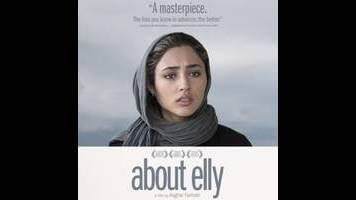Liars hold a special fascination for Asghar Farhadi. The Iranian filmmaker builds movies around deception—what some characters know but others do not, and how that discrepancy in knowledge sends shockwaves through their middle-class lives and families. About Elly, the third of the writer-director’s films to make its way to American theaters, is another unraveling web of secrets, a drama that takes on the urgency of a thriller as key pieces of information come to light. Farhadi made the movie back in 2009, before his Oscar-winning masterpiece A Separation and the more recent The Past, but it fell into release-date limbo when the original U.S. distributor went belly up. Now that Cinema Guild has secured theatrical rights, and is belatedly opening About Elly in select markets across the country, American audiences have older proof of what this gifted dramatist can do with a strong cast, a volatile situation, and the big problems caused by little bends in truth.
As with his subsequent efforts, Farhadi takes his time getting to the conflict, using an ostensibly placid first act to quietly plant seeds of unrest. About Elly opens with a group of Iranian college friends—among them three couples, two with children—decamping to a rustic villa on the scenic banks of the Caspian Sea. For a few of these affluent vacationers, R&R isn’t the only item on the agenda: The married Sepideh (Golshifteh Farahani) has invited her daughter’s kindergarten teacher, Elly (Taraneh Alidousti), to accompany them on the trip, with hopes that the shy instructor might develop a love connection with divorcé Ahmad (Shahab Hosseini), who’s visiting from Germany. It seems an innocent act of matchmaking, and things go swimmingly for a while, as Ahmad appears to make inroads with Elly, even as the latter struggles a little to fit in with these close-knit marrieds. But the holiday weekend takes a turn for the traumatic when one of the kids nearly drowns; this tragedy averted, the group discovers that Elly, who was planning on leaving that day and who had been watching the children when one of them waded into the water, is nowhere to be found. The worst-case scenario—she was claimed by the waves while trying to rescue the boy—is also the most probable one.
Because of its seaside setting, its cast of well-off characters, and its focus on the disappearance of a young woman, About Elly has earned comparisons to that bewildering classic of art-cinema, L’Avventura. But while Michelangelo Antonioni perversely bypassed the dramatic possibilities of his missing-person premise, Farhadi uses his own as the catalyst for a chaotic study in blame deflection, crisis management, and lies by omission. Wracked with guilt, the remaining characters turn over the previous day’s events in their heads, clinging to the thin hope that maybe Elly just up and left. Social faux pas—a mistimed laugh, a comment that might have scanned as insensitive—become vital clues. Meanwhile, the only witnesses to what really happened on the beach are too young to hold up to sustained interrogation.
As the mystery stubbornly resists solving, hints of tension among the characters become more than hints. Peyman Moaadi, star of A Separation, here plays a seemingly relaxed, enlightened family man who loses his cool under duress, transforming overnight into a controlling husband and father. Similarly, Sepideh’s spouse, Amir (fellow Iranian filmmaker Mani Haghighi), looks at first like the most laid-back of these educated friends, until the circumstances draw out the resentment he feels toward his wife for meddling. Disaster is like a magnifying glass for these characters, whose hang-ups and hostilities—the undercurrents of their cozy group dynamic—shift into sharper focus with the first signs of trouble.
This being a Farhadi picture, there are also plenty of falsehoods, most of them uncovered only when the deceitful parties find their backs against the wall. It’s in the second half, when a new character penetrates the film’s bubble of regret and panic, that the director really starts ratcheting up the intensity and intrigue. Was Sepideh’s set-up as innocuous as it first appeared, or is there more to the missing woman than the movie—and its protagonists—initially reveal? About Elly isn’t as formally or structurally accomplished as A Separation; the near-drowning scene, for example, is something of a mess, expressing distress through erratic camerawork, and the film might have benefitted from a less cut-and-dry ending. (As his next two pictures would reveal, Farhadi is now a pro at leaving his characters hanging in the agonizing balance.) Even still, this is clearly the work of a master in the making, an artist on the cusp of greatness. Farhadi may be fixated on fibbers, but there’s almost no one working today who makes films so emotionally honest.









































